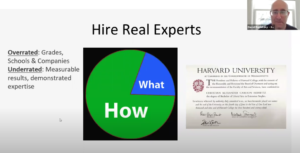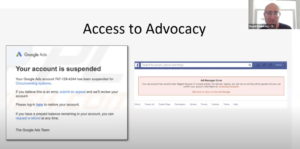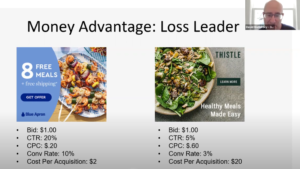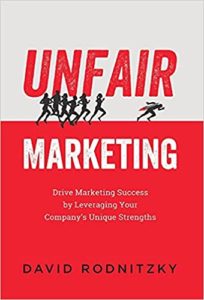
Note: This post was written by Nicole Pyles.
Online marketing used to be as easy as panning for gold during the California Gold Rush. You didn’t need to put in a whole lot of effort to earn a decent income. However, much like the gold rush, the competition heated up and made it harder to earn a living.

David Rodnitzky, founder of 3Q Digital and author of Unfair Marketing was inspired by this analogy when writing the book. He joined the Bay Area Content Marketing Meetup recently to discuss how to use your unfair marketing advantage to grow your business.
Rodnitzky proves that what can seem easy can often be the hardest to put into practice. Here are five unfair marketing advantages he’s seen in the companies he’s worked with.
1) Creating an unfair data advantage
In marketing, we often have so much data that we don’t know how to use it properly. However, if you compile your data correctly, you can analyze a potential scenario to properly target your advertising and attract the right purchasers. Rodnitzky recommends thinking of your data in four broad ways that will help you figure out the differences that gives you the advantage.
What data do you have and where is it?
Make a comprehensive list of all the data you have and where to access it. Consider your CRM, marketing automation, financial system, your point of sale, marketing channel, surveys, or other competitive intelligence. Rodnitzky says, “In each of these sources, there are millions or billions of pieces of data that are potentially valuable to you.”
What types of data should you be collecting?
There are generally four types of data you should be collecting: customer, financial, product, and marketing data. “You can spend a lot of effort, and you should, frankly, be collecting all this information and making sure you know what are the sources of data and what are the types of data that you have available,” Rodnitzky says.
How are you tracking your data on a granular level?
You want to create as much tracking as you can, because by tracking at the granular level, you can see the difference in your data. Information such as customer IDs, login information cookies, URL tracking, unique phone numbers, and coupon codes are different ways to create granular tracking. This helps you get very specific about what is happening with your business.
How are you combining the data?
Combining your data includes normalization and attribution. With normalization, you are taking your data sources, data types, and your granular tracking methods to draw connections and comparisons between these data sources. With attribution, you are giving credit to different touch points along the way to a purchase. When you get precise about the attribution of a customer, you can be smarter about your advertising investments.
One important aspect about data: unless you make it actionable, you are wasting your time. “Every company has proprietary data. Every company has data that could create an unfair advantage. It’s a matter of whether you can put all these different pieces together and take it from concept to actionability,” Rodnitzky says.
2) Creating an unfair knowledge advantage

Rodnitzky points out how surprising it is that many companies don’t hire, retain, and measure the talent on their marketing team. If you retain and measure your experts, you will have an advantage over your competition. So, how do you hire experts that give you an unfair advantage?
Rodnitzky suggests you ask a candidate this question:
What are your quantifiable stories of success?
When the candidate answers, listen for their “how” and their “why.” When you find someone who can prove and explain their expertise, you have someone who will give you an unfair knowledge advantage.
Building this knowledge advantage means being relentless about remaining objective and quantifiable. You need to hold your team to measurable KPIs. Choose two KPIs that can’t be explained away but that are specific and measurable.
Perform audits and hire consultants that will ensure you are doing things right. Test teams against each other. “It’s always hard to fire friends and to be tough on your team, but if you want to create a knowledge advantage, that’s what you need to do. Leave no doubt,” Rodnitzky says.
3) Creating an unfair access advantage
Every company has access to connections that can be valuable to their business if they look hard enough. Consider an example with the advertising world. When Rodnitzky was buying billboard ads for his company, he found discounted inventory through a contact that sold him the billboard advertising space. Having that access to this remnant inventory gave him an advantage.
Having access to testing can be another advantage. Because Rodnitzky’s agency is one of the biggest buyers of Google advertising, whenever Google has a new product to test, they call him. Having this access allows them to use these new products, which can drive better results, as well as gain free advertising.

Advocacy is another access advantage. Companies will go to 3Q Digital because they have been blacklisted by Google and are no longer able to run ads. “I can’t guarantee this for every company, but in many instances, we’ve been able to get companies back unsuspended and un-blacklisted because of our reputation and because of our connections,” Rodnitzky says.
Publicity is another advantage. Ask yourself: who do you have access to and how can you leverage them? Rodnitzky used his own blog to get an introduction to a medium-sized online publication that gave him a column.
This led to an opportunity to work for an even bigger organization, which then led him to thought leadership and the speaking circuit. Regardless of your business size or network size, you are connected to someone that can help your company, whether it’s with publicity, advocacy, testing, or inventory.
4) Creating an unfair brand advantage
Having a great brand will give you an unfair advantage. One of the first ways it helps is with publicity. For example, if the Wall Street Journal is running an article about soda, a brand like Pepsi will most certainly be courted by that newspaper.
Google will have a much larger advantage than a smaller company because everyone wants to work with Google. So, it’s far easier for Google to recruit a potential candidate than another small company.
Another example is with direct response advertising. If people need to decide between buying a familiar brand and an unfamiliar brand, they’ll more likely buy from a familiar brand because they recognize them.
You will do better than your competition simply because of your strong brand presence. When it comes to online marketing, you want to be either the big brand, or the low-coast leader, but you want to avoid the muddy middle.
5) Creating an unfair money advantage
Having enough money means you can buy better tools for your data and gain access to more data scientists. With money you can hire the best experts, buy your way into connections with publicity and advocacy, and use branding dollars to improve the power of your brand.
Another way money gives you an advantage is you can play the loss leader strategy (i.e., if you so desire). This means losing money on an initial purchase to make it up in subsequent purchases.

Let’s say you are a subscription service that sells meals to customers. One company may just advertise themselves as healthy meals, and another may offer eight free meals to customers. When you offer a customer something for free, you will have a higher conversion rate, and you are likely to have someone longer and maintain them as a customer.
This is an example where money gives you an unfair advantage over companies that don’t have the ability to play that game.
Another great money advantage is optimizing for lifetime value: you are focusing on acquiring a customer today that may not become profitable for another five to ten years.
You may spend a lot of money to acquire that customer, but if you advertise to them and they become a long-term customer, you will net out over the lifetime of your company.
Amazon is an example of this. While they lost money in their first 10 to 15 years of business, now they are making billions of dollars each month because of this method.
Wrapping up

By focusing on your unfair advantage, you are taking part in a philosophical exercise to figure out which unfair advantage exists in your company.
It could be data, how you organize, how you find it, what you do with it, the knowledge on your team, hiring the best people possible for your team, your publicity, and money.
The full title of David’s book is “Unfair Marketing: Drive Marketing Success by Leveraging Your Company’s Unique Strengths.” You can buy the book at Amazon.
Watch the recording
Watch the recording of David’s talk at the Bay Area Content Marketing Meetup:
